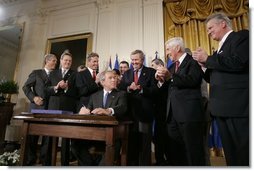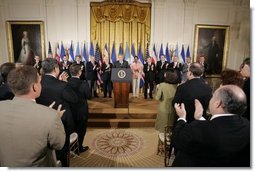
 |
For Immediate Release
Office of the Press Secretary
August 2, 2005
President Signs CAFTA-DR
The East Room
|
|||||
11:15 A.M. EDT
THE PRESIDENT: Thanks for the warm welcome. Welcome to the White House. Last week, Congress passed the Central American-Dominican Republic Free Trade Agreement. I want to thank the Republicans and Democrats who came together to support this important agreement. The bill I'm about to sign is good for America. I'm pleased that Congress has taken a step to eliminate the barriers to America's goods and crops to 44 million customers.
 I welcome the opportunity to make our nation more secure by strengthening
our ties with democracies that share our belief in free markets and free
government. I appreciate the vision and leadership of Bob Zoellick and Rob
Portman and the many others who worked hard to get this agreement passed.
I want to thank the Secretary of State, Condi Rice, for the outstanding job
she's doing on behalf of the American people. I want to thank Secretary
Mike Johanns from the Department of Agriculture for joining us. And,
Stephanie, thank you for being here. I appreciate Secretary Carlos
Gutierrez of the Department of Commerce for his good work.
I welcome the opportunity to make our nation more secure by strengthening
our ties with democracies that share our belief in free markets and free
government. I appreciate the vision and leadership of Bob Zoellick and Rob
Portman and the many others who worked hard to get this agreement passed.
I want to thank the Secretary of State, Condi Rice, for the outstanding job
she's doing on behalf of the American people. I want to thank Secretary
Mike Johanns from the Department of Agriculture for joining us. And,
Stephanie, thank you for being here. I appreciate Secretary Carlos
Gutierrez of the Department of Commerce for his good work.
We're honored to be joined by the Chairman of the Senate Foreign Relations Committee, Dick Lugar. I appreciate you coming, Senator. I'm honored you're here. Senator Norm Coleman, who is the Chairman of the Foreign Relations Committee, Western Hemisphere Subcommittee. I appreciate Congressman Clay Shaw, who is the Chairman of the House Ways and Means Trade Subcommittee -- I'm honored that these three members of Congress are standing with us today.
I appreciate los Embajadores from the Central American countries: Ambassador Duenas, Ambassador Stadthagen, Ambassador Espinal, Ambassador Castillo de Guatemala. By the way, Espinal is Dominican Republic; Ambassador Stadthagen is from Nicaragua; Duenas is from Costa Rica. I appreciate Ambassador Leon from El Salvador, who is with us. I want to thank the Special Envoy Garcia from Honduras. I appreciate Ana Escobar, who is the Vice President of El Salvador, for joining us. Bienvenidos. And I want to thank Jose Insulza, who is the Secretary General of the Organization of American States, for joining us. Welcome.
All of us in this room understand that to keep our economy growing and creating jobs, we need to open markets for American products overseas. All of us understand that strengthening our economic ties with our democratic neighbors is vital to America's economic and national security interests. And all of us understand that by strengthening ties with democracies in our hemisphere, we are advancing the stability that comes from freedom.
Right now, Central American goods face almost no tariffs when they enter the United States. By contrast, U.S. exports to Central America still face hefty tariffs there. CAFTA will end these unfair tariffs against American products and help ensure that free trade is fair trade.
 By leveling the playing field for our products, CAFTA will help create jobs
and opportunities for our citizens. As CAFTA helps create jobs and
opportunity in the United States, it will help the democracies of Central
America and the Dominican Republic deliver a better life for their
citizens. By further opening up their markets, CAFTA will help those
democracies attract the trade and investment needed for economic growth.
By leveling the playing field for our products, CAFTA will help create jobs
and opportunities for our citizens. As CAFTA helps create jobs and
opportunity in the United States, it will help the democracies of Central
America and the Dominican Republic deliver a better life for their
citizens. By further opening up their markets, CAFTA will help those
democracies attract the trade and investment needed for economic growth.
This economic growth will boost demand for U.S. goods and reduce poverty and contribute to the rise of a vibrant middle class. This economic growth will raise working standards and will deliver hope and opportunity to people who have made the choice for freedom. The more opportunity that Central Americans have at home to provide for themselves and their families means it's less likely that someone looking for a job will try to come to this country illegally.
By strengthening the democracies in the region, CAFTA will enhance our nation's security. Two decades ago, many of the CAFTA nations struggled with poverty and dictatorship and civil strife. Today, they're working democracies, and we must not take these gains for granted. These nations still face forces that oppose democracy, seek to limit economic freedom, and want to drive a wedge between the United States and the rest of the Americas. The small nations of CAFTA are making big and brave commitments, and CAFTA is a signal that the United States will stand with them and support them. By helping the CAFTA nations build free societies, we'll help them eliminate the lawlessness and instability that terrorists and criminals and drug traffickers feed on. And this will make our country safer.
CAFTA is more than a trade bill; it is a commitment among freedom-loving nations to advance peace and prosperity throughout the region. As the oldest democracy in the Western Hemisphere, the United States has a moral obligation and a vital national security interest in helping democracies in our neighborhood succeed, and CAFTA advances this goal.
And to ensure that the 21st century is one of prosperity and freedom and security, my administration will continue to work to strengthen democracy and open markets for American exports all across the world.
And now it's my honor to invite the members of the Congress to join me as I sign the legislation that will implement the Central American Dominican Republic Free Trade Agreement. (Applause.)
(The bill is signed.) (Applause.)
END 11:21 A.M. EDT